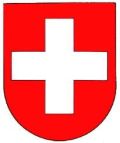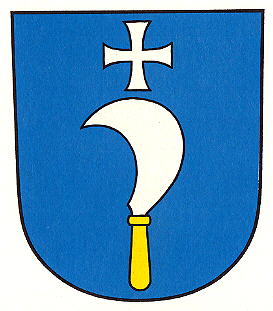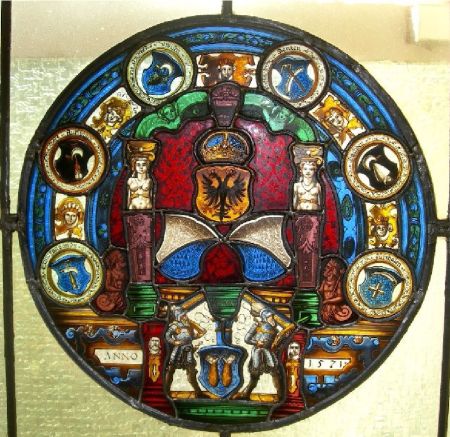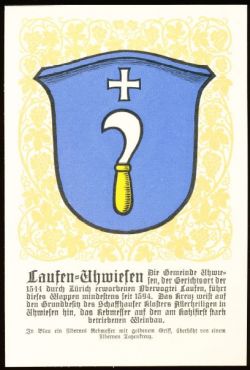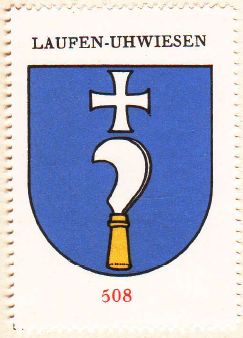Laufen-Uhwiesen
Swiss heraldry portal
This page is part of the Swiss heraldry portal |
Heraldry of the World |
|
Swiss civic heraldry:
|
Other heraldry: |
LAUFEN-UHWIESEN
Canton : Zürich
Official blazon
- (de) In Blau ein silbernes Rebmesser mit goldenem Griff, überhöht von einem silbernen Tatzenkreuz.
Origin/meaning
The arms were officially adopted on October 27, 1927.
The municipality was created in 1831. The village of Uhwiesen was historically the main village in the new municipality. In 1571 a so called Wappenschiebe (stained glass plate or window) was made of the Obervogtei Laufen. This was at the time a lower level bailiwick of the Zürich Kanton. Until 1540 it was a higher level bailiwick, since 1540 it was under the Landvogtei Kyburg. The Wappenscheibe indicates the allegiance to Zürich with the arms of the Kanton in the centre, surrounded by the arms of the villages in the bailiwick. In the base the arms of the Bailiwick, two upwards placed hands. The bailiwicks were abolished in 1803 and in 1814 replaced by Oberämter. The area belonged since then to Oberamt Andelfingen.
The arms of the Laufen (also Lauffen) Landvogtei and Castle were still shown as arms for the municipality until 1927.
| The 'Wappenscheibe' of the Obervogtei Laufen (1571) |
The arms of the Landvogtei for the municipality in 1860 |
In the Wappenscheibe above the arms of the village of Uhwiesen are shown as a bunch of grapes under a knife. At the same time the village and surroundings belonged to the Amt Uhwiesen of the Diocese/State of Konstanz. In 1594 the arms of this Amt were a (grape) knife under a small cross and above a small hill. Colours of these arms are known from 1649, the field is red, the hill gold and the knife and cross silver. These arms were adopted without the hill and in the colours of Zürich in 1927.
| The arms on a postcard (pre 1940) |
The arms in the Kaffee Hag albums 1914-1960 |
Contact and Support
Partners:
Your logo here ?
Contact us
© since 1995, Heraldry of the World, Ralf Hartemink
Index of the site
Literature : Ziegler, 1977
